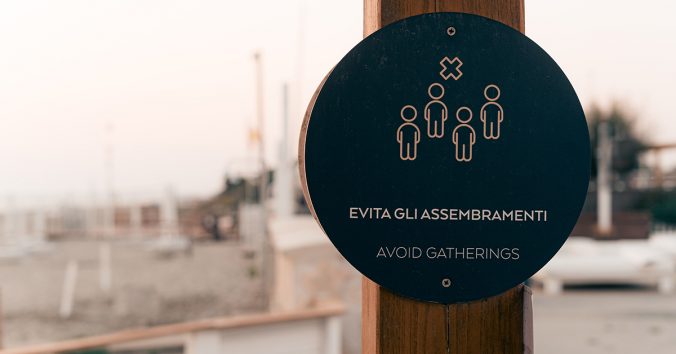Italy was the first country in Europe to be hit hard by the Covid-19 pandemic. It started mainly in the northern regions, but soon the same public health measures were introduced throughout the country. Commercial and social activities were closed, as were schools and universities. Only points of sale that were deemed necessary were allowed to remain open, such as pharmacies, grocery stores and newsstands. It became forbidden to move outdoors except for certain purposes.
How did people react to the measures? During the late spring and early summer of 2020, an in-depth interview study was conducted with a number of Italian residents of different gender, age, education and home region. The study was recently published as an article by Virginia Romano, Mirko Ancillotti, Deborah Mascalzoni and Roberta Biasiotto. The interviews touched on everyday life during the lockdown as well as perceptions of the public health measures, but also possible priority-setting criteria in intensive care were discussed, as well as views on how the media and information worked.
Several participants described how, after an initial difficulty in understanding and accepting the changes, they soon adapted. Their fear decreased and routines for working from home were established. They began to appreciate increased time with family and a lifestyle with less travel and stress. On the other hand, it was perceived that the public health measures, with their many rules to follow, created a distinction between “us” and “them.” Participants expressed that they began to observe and blame others for not following the rules, while at the same time feeling themselves observed and blamed. This fragmentation was met with disappointment, as the interviewees had hoped that the pandemic would, on the contrary, unite society and increase solidarity and tolerance. However, some experienced just such positive effects. The use of a face mask, for example, was perceived as respectful behaviour towards others.
In general, participants were positive about the public health measures, which were considered necessary to control the pandemic. On the other hand, suspicions were directed at economic interests to maintain productivity. It was perceived that lobbyists were pushing to postpone the lockdown and to speed up the easing of restrictions. Furthermore, it was considered that the pandemic revealed a need to better organize healthcare in Italy. The restrictions also increased the interviewees’ awareness of inequalities in society, for example regarding living space, access to garden and proximity to nature, as well as opportunities to work from home with stable income.
The participants also discussed hypothetical inclusion and exclusion criteria in intensive care, and described their impressions of how information and media functioned during the pandemic spring. The first question was of course difficult to handle for the participants. It was easier to admit that trust in information and the media had decreased. Some participants reported that they developed more critical attitudes towards the sources of information in the media.
If you want more results and the authors’ own discussion, read the article here: Italians locked down: people’s responses to early COVID-19 pandemic public health measures

Written by…
Pär Segerdahl, Associate Professor at the Centre for Research Ethics & Bioethics and editor of the Ethics Blog.
Romano, V., Ancillotti, M., Mascalzoni, D. et al. Italians locked down: people’s responses to early COVID-19 pandemic public health measures. Humanit Soc Sci Commun 9, 342 (2022). https://doi.org/10.1057/s41599-022-01358-3
Ethics needs empirical input



0 Comments
1 Pingback